|
|
|
Sort Order |
|
|
|
Items / Page
|
|
|
|
|
|
|
| Srl | Item |
| 1 |
ID:
161893
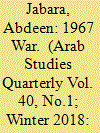

|
|
|
|
|
| Summary/Abstract |
In this highly personal firsthand account, a leading Arab American activist traces his history as a child in a small town in northern Michigan to his growing political activism spurred on by experiences in the Middle East and the 1967 war. He places particular emphasis on the Association of Arab American University Graduates (AAUG) and National Lawyers Guild (NLG). Both of these organizations, very early on, took principled, yet highly controversial stances in favor of a Palestinian state.
|
|
|
|
|
|
|
|
|
|
|
|
|
|
|
|
| 2 |
ID:
102429
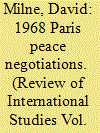

|
|
|
|
|
| Publication |
2011.
|
| Summary/Abstract |
This article draws on fresh archival research to challenge Robert Putnam's 'Two Level Game Theory'. In his seminal article, 'Diplomacy and Domestic Politics: The Logic of Two Level Games', published by International Organization in 1988, Putnam contended that international negotiations proceed at the domestic level and at the international level. In taking diplomatic initiatives forward, leaders are compelled to respond to the needs of domestic constituencies, through granting concessions and building coalitions, while international negotiations are pursued with one goal in mind: that any agreement will not damage the domestic political calculus. This article contends that Lyndon Johnson's actions in 1968 disprove this thesis. The President was in fact relaxed about a Richard Nixon victory in the general election as his commitment to defend South Vietnam from communism was stronger than that of his sitting Vice President, Hubert Humphrey. The President's concern for the fate of South Vietnam thus superseded his concern for his 'normal supporters'- the Democratic Party at large - who had become so hostile towards his management of the Vietnam War.
|
|
|
|
|
|
|
|
|
|
|
|
|
|
|
|
| 3 |
ID:
126736
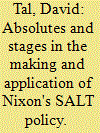

|
|
|
|
|
| Publication |
2013.
|
| Summary/Abstract |
President Richard Nixon and his National Security Adviser, Henry Kissinger took great pride in their success to achieve agreements on the limitation of Anti Ballistic Missiles and the Interim Agreement on Strategic Missiles with the Soviet Union. For Nixon, this agreement was not only an achievement that had been denied to his predecessor, it also seemingly represented the success of his own approach over that of his predecessors. Nixon-in tandem with Kissinger-intended to link arms control negotiations with the Soviet Union to the resolution of other political problems such as Vietnam, the Mideast, and Berlin. Through the employment of linkage, they hoped to make U.S. arms control policy part of Détente. However, Nixon was able to sign the "historic agreements" because his policy of linkage had in fact failed. It failed mainly because it was based on flawed assumptions and false premises. Thus, the historic success was possible precisely because Nixon had not actually made his arms control policy "distinct" from that of the Johnson Administration and its predecessors in his approach to strategic arms talks with the Soviet Union
|
|
|
|
|
|
|
|
|
|
|
|
|
|
|
|
| 4 |
ID:
159674
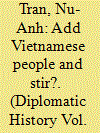

|
|
|
|
|
| Summary/Abstract |
To a serious student of Vietnamese history, Ken Burns’s and Lynn Novick’s The Vietnam War is both refreshing and maddeningly unimaginative. Perhaps the most outstanding feature of the mini-series is the inclusion of politically diverse Vietnamese voices. The film boasts a rich tapestry of interviews with North and South Vietnamese veterans, communist guerilla fighters, and Vietnamese refugees. Their stories are interwoven with more familiar accounts of American soldiers, protestors, and government officials. Although the filmmakers give more airtime to American perspectives, The Vietnam War does a far better job of acknowledging competing Vietnamese viewpoints than most documentaries. Burns and Novick hoped that this “many sides” approach would convey the multifaceted complexity of the war. As they write in the companion volume to the documentary, “From the start, we vowed to each other that we would avoid the limits of a binary political perspective and the shortcuts of conventional wisdom and superficial history. This was a war of many perspectives, a Rashomon of equally plausible ‘stories,’ of secrets, lies, and distortions at every turn.”1
|
|
|
|
|
|
|
|
|
|
|
|
|
|
|
|
| 5 |
ID:
189198


|
|
|
|
|
| Summary/Abstract |
EVENTS around Ukraine have naturally overshadowed many other aspects of life in other countries, including the US, where the results of the 20-year war in Afghanistan became a hot topic in late 2021. But it seems that this topic will inevitably be revisited as the most recent experience of direct military operations by the US Armed Forces.
|
|
|
|
|
|
|
|
|
|
|
|
|
|
|
|
| 6 |
ID:
110305


|
|
|
|
|
| Publication |
2012.
|
| Summary/Abstract |
In the United States, the decision to go to war has often been propelled by a singular event, a 'trigger' that both galvanises and unites, at least temporarily, the US Congress, the nation's press and the American public. The attack on Pearl Harbor precipitated US entry into the Second World War, and the attack on the World Trade Center on 11 September 2001 led to American military involvement in Afghanistan. In both instances, thousands of innocent Americans had been killed on American soil by an easily identifiable, foreign enemy. The United States entry into the Korean War resulted from a somewhat different kind of trigger. While US forces were not directly attacked, there was, as President Lyndon Johnson's Deputy Undersecretary of State George Ball once wrote, 'a massive land invasion by 100,000 troops … a classical type of invasion across an established border'. Ball argued that North Korea's invasion of South Korea in June 1950 provided 'an unassailable legal and political basis for counteraction'.
|
|
|
|
|
|
|
|
|
|
|
|
|
|
|
|
| 7 |
ID:
102957
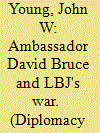

|
|
|
|
|
| Publication |
2011.
|
| Summary/Abstract |
Recent decades have seen growing historical interest in "second rank" officials who, whilst they do not play a leading role in government or political movements, can influence the way decisions are shaped and executed. At the same time, the interest of scholars in American policy during the Vietnam War shows no signs of abating. This article investigates the experience of one second rank official during the war, David Bruce, who was Ambassador to London during 1961-1969. Making particular use of Bruce's extensive diaries, it traces his shifting views on the war, looks at the extent to which he shared the outlook of other official,s and asks what influence, if any, he had on events. It argues that, whilst he always remained loyal to his own government and often mirrored the outlook of the Johnson Administration, Bruce had his own perspective on events, was consistently critical of American tactics on the ground, and, in Spring 1967, influenced by Robert McNamara, became an early advocate of retrenchment.
|
|
|
|
|
|
|
|
|
|
|
|
|
|
|
|
| 8 |
ID:
119997
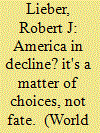

|
|
|
|
|
| Publication |
2012.
|
| Summary/Abstract |
The notion of American decline, although now pervasive, is not entirely new. Current concerns need to be seen against a history of pessimistic assessments, as for example during the Great Depression, the post-Vietnam War era, and again in the late 1980s when fears of Japanese primacy and the rise of the European Union as a world power were widely held. Once again the United States needs to overcome serious problems, but much of the thinking and writing about the American future reflects a stubborn undervaluation of the country's resilience, fundamental strengths, and ability to overcome adversity.
|
|
|
|
|
|
|
|
|
|
|
|
|
|
|
|
| 9 |
ID:
049440
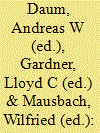

|
|
|
|
|
| Publication |
Cambridge, Cambridge University Press, 2003.
|
| Description |
xii, 371p.Pbk
|
| Series |
Publications of the German Historical Institute
|
| Standard Number |
052100876X
|
|
|
|
|
|
|
|
|
|
|
|
Copies: C:1/I:0,R:0,Q:0
Circulation
| Accession# | Call# | Current Location | Status | Policy | Location |
| 047259 | 909.826/DAU 047259 | Main | On Shelf | General | |
|
|
|
|
| 10 |
ID:
130239
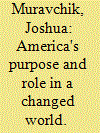

|
|
|
|
|
| Publication |
2014.
|
| Summary/Abstract |
Almost every war that America has fought since the beginning of the twentieth century was a war America had determined to avoid. We were neutral in World War I?.?.?.?until unlimited submarine warfare against our trans-Atlantic shipping became intolerable. We resisted entering World War II until Pearl Harbor. We defined the Korean peninsula as lying outside our "defense perimeter," as our secretary of state declared in 1950, a few months before North Korea attacked South Korea and we leapt into the fray. A few years later, we rebuffed French appeals for support in Vietnam in order to avoid involving ourselves in that distant country which was soon to become the venue of our longest war and greatest defeat. In 1990, our ambassador to Iraq explained to Saddam Hussein that Washington had "no opinion on?.?.?.?your border disagreement with Kuwait," which he took as encouragement to swallow his small neighbor, forcing a half million Americans to travel around the world to force him to disgorge it. A year after that, our secretary of state quipped about the violent disintegration of Yugoslavia that "we have no dog in that fight," a sentiment echoed by his successor, of the opposite party, who, demonstrating his virtuosity at geography, observed that that country was "a long way from home" in a place where we lacked "vital interests"-all this not long before we sent our air force to bomb Serbia into ceasing its attacks on Bosnia and then bombed it again a few years later until it coughed up Kosovo.
|
|
|
|
|
|
|
|
|
|
|
|
|
|
|
|
| 11 |
ID:
124716
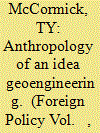

|
|
|
|
|
| Publication |
2013.
|
| Summary/Abstract |
The article provides various historical anecdotes regarding efforts to engineer weather and climate. It includes the 1841 theories of American meteorologist James Pollard Espy to promote rain by igniting massive fires, the 1896 findings by Swedish chemist Svante Arrhenius that found a direct correlation between a rise in carbon dioxide levels and rising temperatures across the globe, and the 1967-1972 Operation Popeye which used cloud seeding as a U.S. military tactic during the Vietnam War and its associated military operations in Cambodia and Laos.
|
|
|
|
|
|
|
|
|
|
|
|
|
|
|
|
| 12 |
ID:
032692


|
|
|
|
|
| Publication |
New York, Hudson Institute, Inc, 1973.
|
| Description |
iii, 307p.
|
| Contents |
V 3 Future of the Future of the Nixon Doctrine in Pacific Asia
|
|
|
|
|
|
|
|
|
|
|
|
Copies: C:1/I:0,R:0,Q:0
Circulation
| Accession# | Call# | Current Location | Status | Policy | Location |
| 017236 | 327.7305/YOK 017236 | Main | On Shelf | General | |
|
|
|
|
| 13 |
ID:
110169
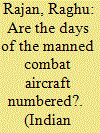

|
|
|
| 14 |
ID:
111050
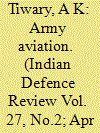

|
|
|
| 15 |
ID:
152003
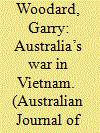

|
|
|
|
|
| Summary/Abstract |
Australia’s commitment in Vietnam can be interpreted as a small ally drawing its superpower partner into war for its own ends. Two studies by eminent Australian authors throw light on the role of human agency, and in so doing bring Australian historiography of the war closer to the trend in the United States. Peter Edwards’s history just about describes Vietnam as ‘Menzies War’. However, he finds no new sources on Menzies’s mindset, and diminishes the roles of his foreign ministers, Garfield Barwick and Paul Hasluck. The late Geoffrey Bolton’s intimate biography of Hasluck shows him as an active minister and also that his private papers are thin on Vietnam, the part of his distinguished career on which he never wrote. The Cabinet meeting of 17 December 1964 reveals much more about Australian decision-making on going to war than can be gleaned from Edwards’s cursory treatment and Bolton’s second-hand account. Barwick’s different approach, and even Hasluck’s last-minute caution, show Australia had a choice. Barwick, if he had remained Foreign Minister, might have kept Australia out of the Vietnam war, so freeing it to continue to play a leading regional political role.
|
|
|
|
|
|
|
|
|
|
|
|
|
|
|
|
| 16 |
ID:
131316
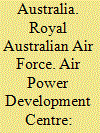

|
|
|
|
|
| Edition |
2nd ed.
|
| Publication |
Canberra, Air Power Development Centre, 2013.
|
| Description |
x, 220p.Pbk
|
| Standard Number |
9781920800925
|
|
|
|
|
|
|
|
|
|
|
|
Copies: C:1/I:0,R:0,Q:0
Circulation
| Accession# | Call# | Current Location | Status | Policy | Location |
| 057782 | 358.4030994/AUS 057782 | Main | On Shelf | General | |
|
|
|
|
| 17 |
ID:
094992
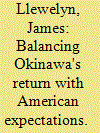

|
|
|
|
|
| Publication |
2010.
|
| Summary/Abstract |
The Vietnam War greatly destabilized Southeast Asia and led to almost a decade of fighting by America and its Asian allies. It was fought on the principle that if communism was unchecked it would overrun the region, with the Southeast Asian countries falling under communist control like 'dominoes'. While countries such as Thailand, South Korea, and Australia provided military support to assist American strategic objectives, Japan, however, was constrained by its peace constitution and thus unable to provide direct military assistance. Nonetheless, under the leadership of the avid anti-communist conservative leadership of Prime Minister Eisaku Sato, Japan still managed to play a role in the Vietnam War. Although Japan initially entertained the notion of facilitating mediation, with Okinawa's reversion hanging in the balance after 1967, Japan's leadership took a more hawkish approach on Vietnam in order to ensure that Washington would agree to reverting Okinawa to Japanese administrative control.
|
|
|
|
|
|
|
|
|
|
|
|
|
|
|
|
| 18 |
ID:
125960
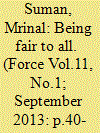

|
|
|
|
|
| Publication |
2013.
|
| Summary/Abstract |
Goldwater-Nichols Department of Defence Reorganisation Act of 1986 (GNA) is generally considered to be the first step in the currently ongoing Revolution in Military Affairs (RMA).
Major blame for the US failure in the Vietnam War was apportioned to segregated planning and operations, resulting in inhibiting the development of a unified war strategy. The catastrophic failure of the Iranian hostage rescue mission in 1980, the infirmities noticed in the invasion of Grenada in 1983 and inability to respond appropriately when 241 US marines were killed in a terrorist attack in Lebanon convinced all that emergent reforms were needed in the US defence organisation
|
|
|
|
|
|
|
|
|
|
|
|
|
|
|
|
| 19 |
ID:
120301
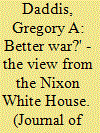

|
|
|
|
|
| Publication |
2013.
|
| Summary/Abstract |
This article examines the relationship between the White House and the US Military Assistance Command, Vietnam (MACV) during President Richard M. Nixon's administration. It argues that dysfunctional civil-military relations between 1969 and 1972 undermined the implementation of a sound military strategy during the United States' withdrawal from South Vietnam as Nixon attempted to achieve 'peace with honor' during the Vietnam War's final campaigns. By 1972, the relationship between the White House and MACV headquarters had reached the nadir of civil-military relations during the Southeast Asian conflict and had served to undercut the United States' ability to effectively disengage from a long and bitterly contested war.
|
|
|
|
|
|
|
|
|
|
|
|
|
|
|
|
| 20 |
ID:
116800
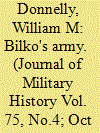

|
|
|
|
|
| Publication |
2011.
|
| Summary/Abstract |
A major criticism of the U.S. Army during the Vietnam War is that it suffered from a crisis in command, especially among officers above the company grade level. Most writing on this topic has centered on structural issues, such as post-World War II personnel policies. This article will examine this phenomenon between the Korean and Vietnam wars by comparing contemporary publications and retrospective critiques by veterans with internal Army sources, particularly service schools, the headquarters of the Continental Army Command, and Headquarters, Department of the Army. If a crisis in command existed between 1953 and 1965, did these organizations' leaders recognize it and address it?
|
|
|
|
|
|
|
|
|
|
|
|
|
|
|
|
|
|
|
|
|